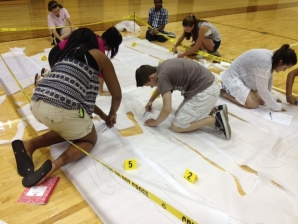
In order to keep up with the interest in the area of forensic sciences that has recently exploded among young science students, Joseph Kulkosky, Ph.D., professor of biology, will expand the program for the second summer of Forensic Sciences Camp. This will allow even more middle school and high school students the opportunity to learn processes and techniques used in the field and in crime scene analysis.
Kulkosky, who is chair of the College’s biology department, is excited about the immediate growth this camp has experienced. Last summer, the camp was held for one week in August, with a cap of 16 students. This summer, though, there will be multiple camps that can include 16 in each camp for 5 consecutive camps during July and August. Registrations will be accepted until classes fill.
Kulkosky believes the increased fascination in forensic sciences comes from TV shows, such as “CSI” and “Law and Order,” which highlight the role of forensics, including DNA and fingerprint analysis, in solving criminal cases. While noting that the media has played a major part in expanding interest in forensics, Kulkosky also debunked what these crime shows use to put away their criminals, referring to it as “secondary evidence.”
The students of Jenks Middle School are Kulkosky’s top priority. He has been working with faculty and staff at Jenks to assess the students’ interest and has been proactive in finding students who would be interested in participating in this camp.
Kulkosky’s favorite part about the Forensic Sciences Camp, and the thing that makes it so compelling, is the “enthusiasm from the students and the use of sophisticated techniques that are quite complex.” One of the things most of the students commented on was dissection. “I most enjoyed the dissection of the pig,” said one student. “The dissection allowed me to further appreciate the work of surgeons.” Another student commented how exciting it was to isolate their own DNA.
The students who attend this camp will be immersed in methods and procedures that are actual techniques used by forensic science majors at CHC. Kulkosky believes that if students retain the information and pursue their interest, this camp can give them a “head start” in their college education in forensics.
Even though this camp is still in its infancy, Kulkosky has gotten a lot of positive feedback from the students who attended last summer. All of the campers’ evaluations said they would recommend the camp to their friends. They also mentioned only good things about Kulkosky, noting how knowledgeable he is and fun to be around. “Dr. K. was a great instructor,” wrote one student. “He made sure everyone was involved.”
With the growing popularity of the field of forensic sciences, it seems likely that this camp will increase in size and popularity as the years go on. As one camper commented, the camp offers the prospect of “meeting new people, learning new things and performing actual experiments.”
For more information, visit the Forensic Sciences Camp webpage.
— Danielle Gehring ’17



